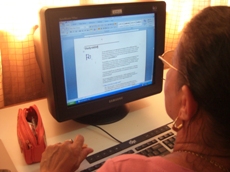|
SAIDE is currently conducting a phased evaluation of a Commonwealth
of Learning (COL) Open Educational Resources (OERs) project implemented
in six countries: Namibia, Botswana, India, Lesotho, Trinidad &
Tobago and Seychelles. Liora Hellmann reports on the first stage
of the evaluation.
The project has as its main aim the training of a 100 master
teachers in the development of high quality, self-instructional,
learning materials.
Materials to support independent study in twenty selected secondary
schooling subjects will be developed and made available electronically
as open education resources (OERs). In this case this means that
the materials will be freely available on a website to download,
use and adapt, provided the author is acknowledge. Basecamp software
(together with the COL instructional design template) has been used
to facilitate a collaborative, online approach to materials development
and as a tool for managing the process. It is intended that the
materials developed will, with some contextual adaptation, be suitable
for use across the six countries, thus maximising their usage.
It is also anticipated that after the project has been completed,
the master teachers will be able to train other teachers in their
respective countries in this type of materials development.
SAIDE’s evaluation began in January 2009, and continues until
September 2010. The evaluation plan breaks down the evaluation into
stages – inputs, processes, outputs and outcomes:
Inputs
- Appropriate teachers are selected to participate in the project;
- Consultants train, assist and support the teachers and subject
teams to develop the materials;
- Country management teams support consultants and teachers to
achieve project objectives;
- COL staff monitor the project and support consultants and country
management teams.
Processes
General project activities undertaken to assist and support teachers
in material development.
Outputs
- Twenty sets of applicable self-instructional learning materials
produced across six developing countries;
- Collection of high quality multi-media content in at least 5
of the 20 subjects;
- Platform used by teachers to develop materials collaboratively;
- Confident and knowledgeable teachers who are able to develop
high quality OERs without support.
Outcomes
- Availability of high quality, effective online education to
open schools and conventional schools where they have computers;
- Access to high quality, relevant and effective multi-media in
5 subjects;
- Appropriate use by education providers of the OERs produced;
- Increased quality of education in countries where OERs are used;
- Professional development of teachers in the use of OER-related
technology;
- Improved teaching and learning in open schools through use
of OERs.
The first report on the input indicators was submitted in June
2009. This report focused on:
- Master teachers with the appropriate expertise:
The report provided profiles of the teachers that were selected
in each of the six countries to participate in this materials
development project. The profiles include the numbers of participants
involved per country, their experience and levels of expertise
in developing self-instructional materials and some reflection
of their language proficiency. Teachers were required to complete
a materials design assessment task to assess their materials design
expertise
- Quality Training: The report provided an evaluation
of the initial project training workshop by the participants,
which includes participants’ comments on various aspects
of the training workshops including the consultants/trainers.
Click
here to view details of findings.
Next step in the evaluation:
At six to eight months into the project, the collaborative processes
for materials development will be examined. Project documentation
and a sample of course materials will be analysed. The materials
will be analysed from both a course design perspective (course purpose,
exit level outcomes and proposed assessment structure) as well as
from a detailed teaching and learning perspective. The online platform
will also be evaluated at this stage. The purpose will be to provide
a progress report and formative feedback to the COL staff and the
country management committees, as well as the teachers, and provide
suggestions and recommendations.
| 
